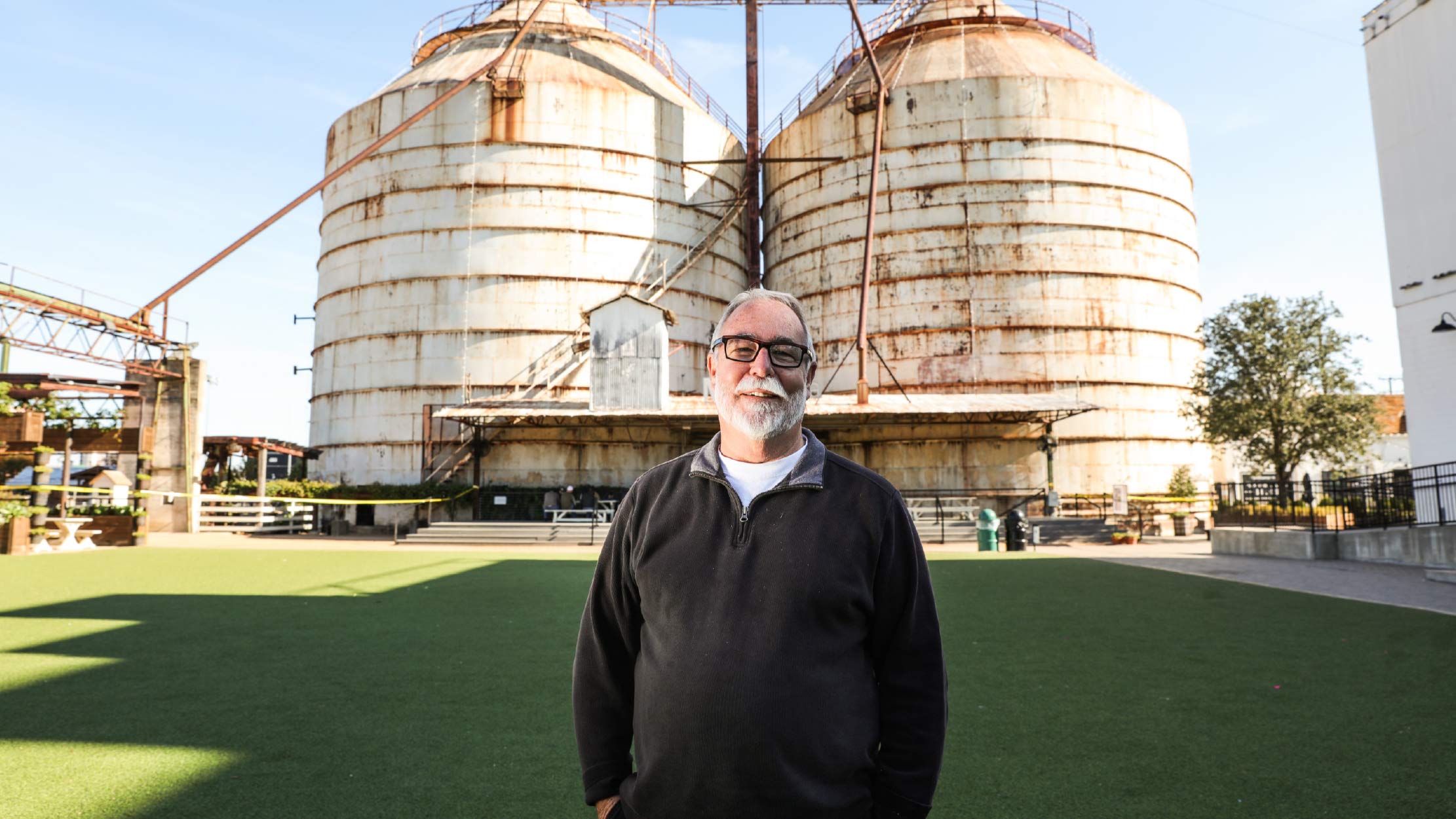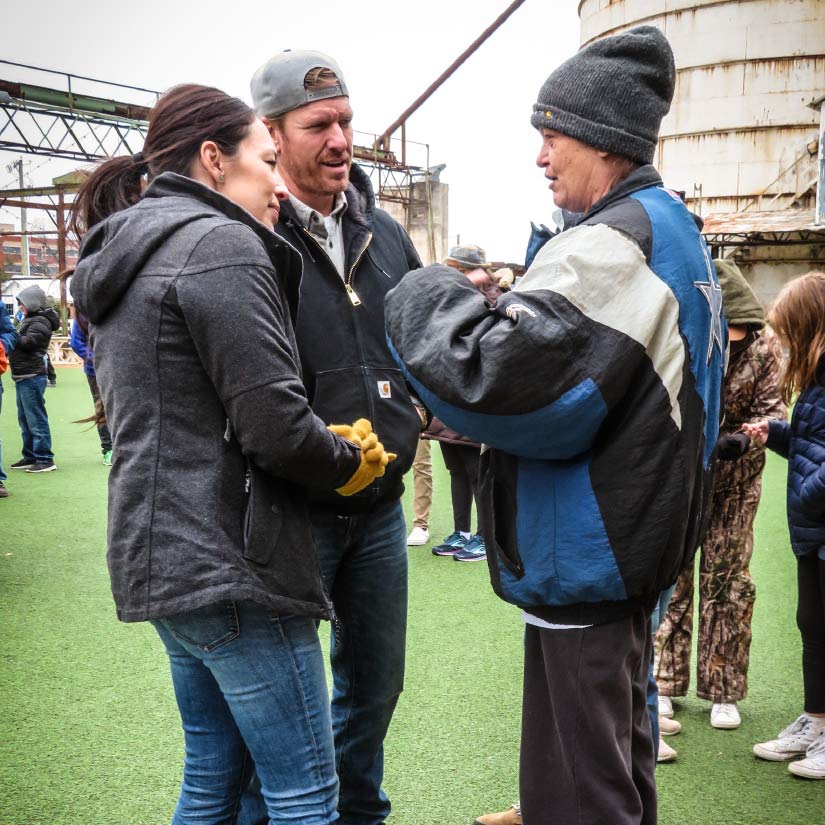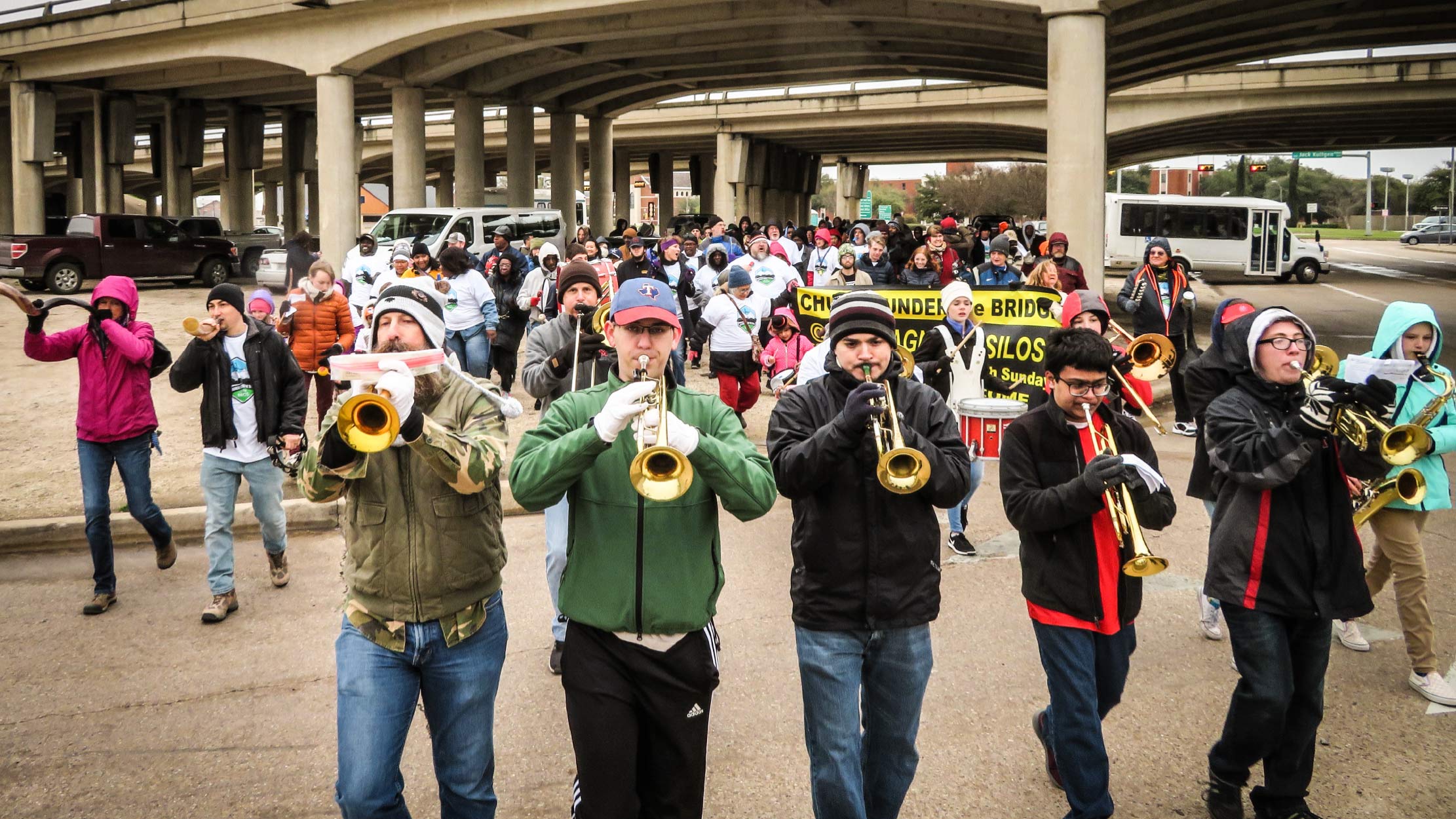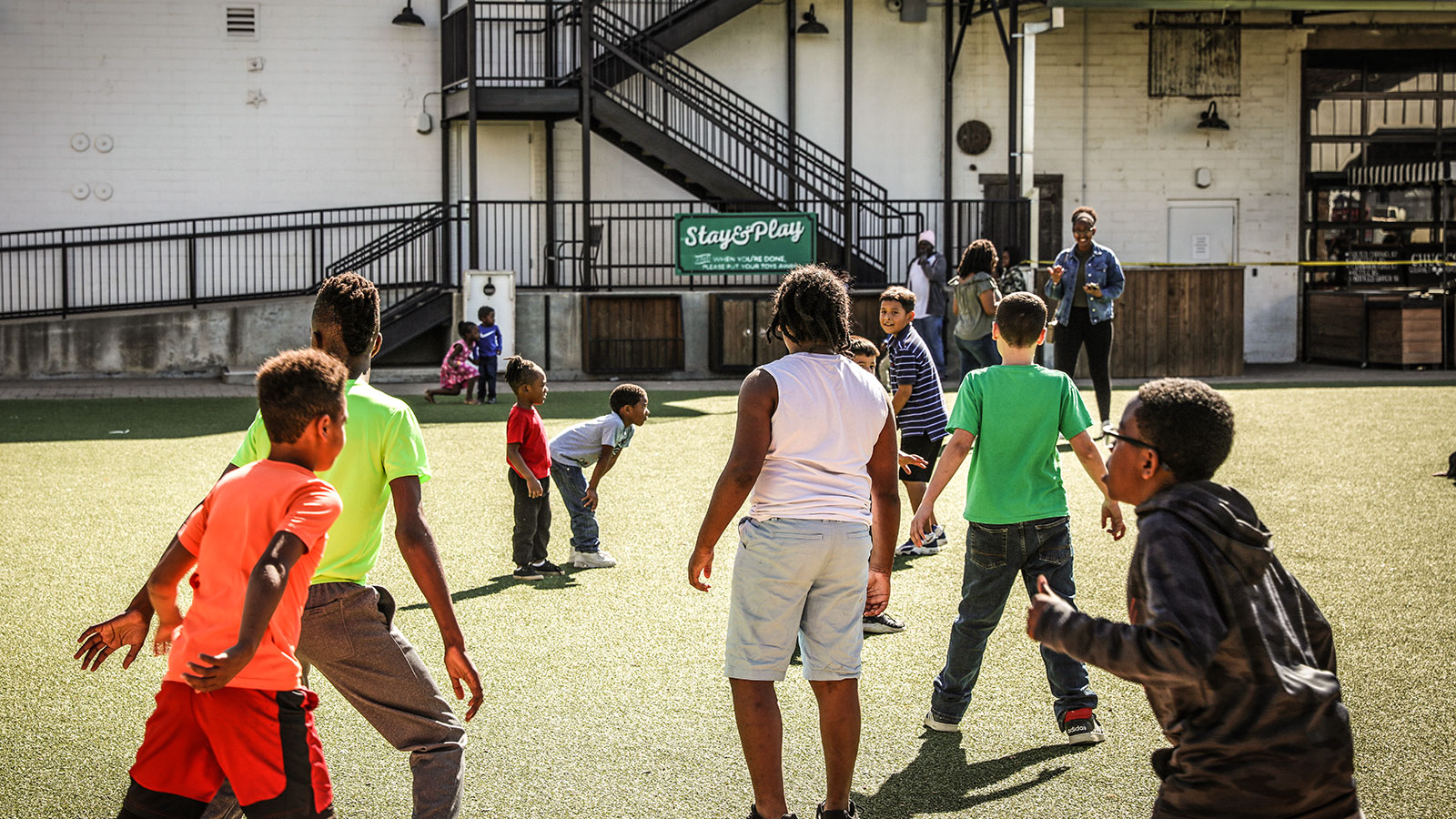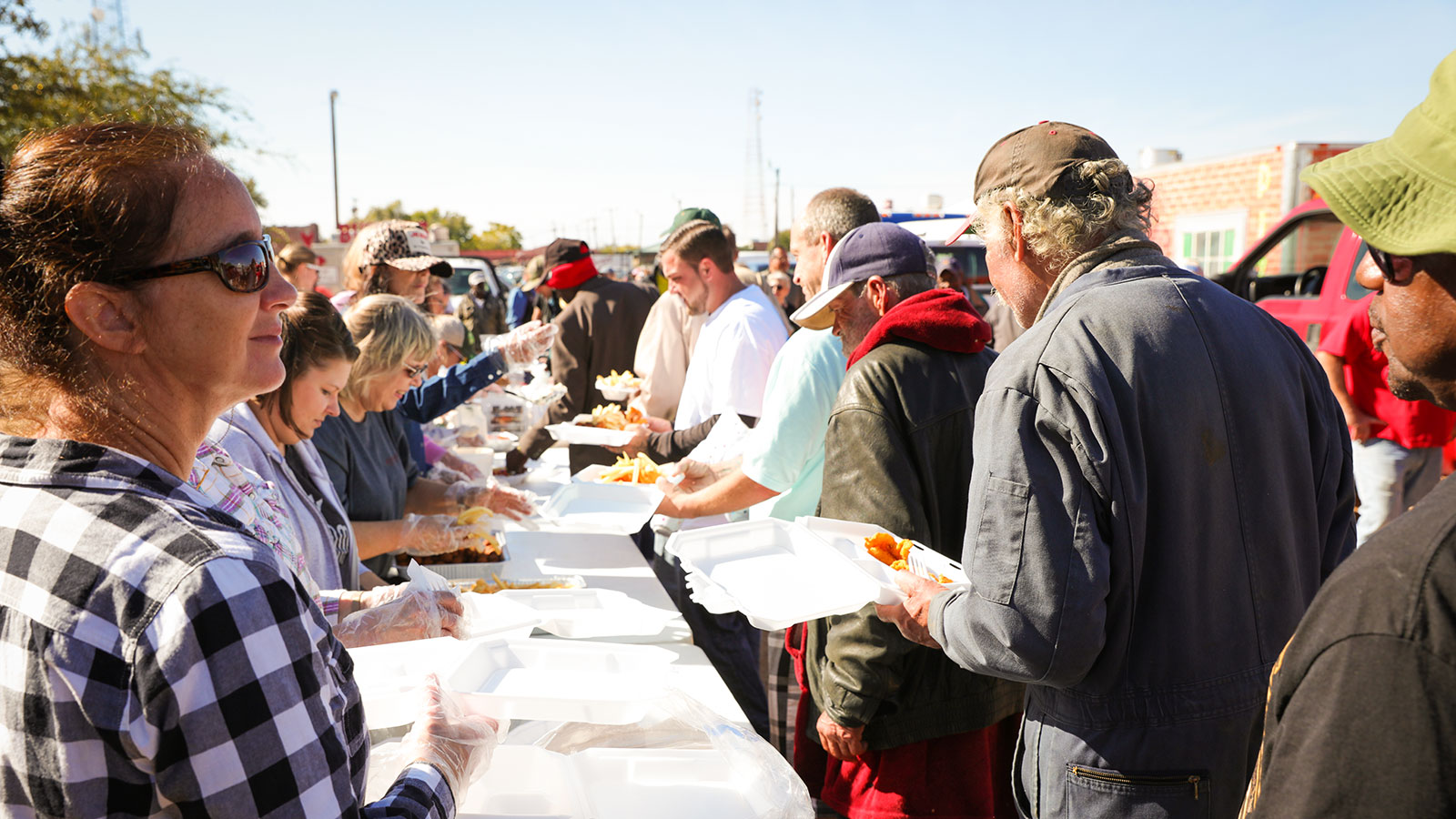We Believe in Home
Highway construction meant Church Under the Bridge needed a temporary home, which led to what might appear to be an unlikely location.
A simple handshake. In a less complicated time, it was enough to solidify a deal or promise a partnership. For persons of integrity, a look in the eye and the clasping of hands was just as binding as signing on the dotted line. It’s still the way longtime Wacoans Chip Gaines, BBA ’98, and Jimmy Dorrell, BA ’72, MES ’93, prefer to confirm a commitment. No overly fussy negotiations. Rather, a mutual understanding of the goal at hand and an agreement on how to go about meeting it.
Gaines is an HGTV celebrity of Fixer Upper fame, an immensely successful businessman, and co-owner of Waco’s home-inspiration empire Magnolia. Dorrell is a pastor, a community development professor, the founder of multiple nonprofits, and an outspoken advocate for the underprivileged. The common ground these men share may not be immediately apparent. But it exists: a shared desire to invest in the betterment of their hometown community by strengthening the lives that comprise it. That their perspectives and daily tasks widely differ is a plus when circumstance — or really, a phone call from Gaines — brings their work together.
Expanding the Interstate, Growing a Partnership
When the Texas Department of Transportation (TXDOT) announced its $300 million project to rebuild Interstate 35, expanding it to four lanes in each direction between North Loop 340 and South 12th Street in Waco, Dorrell knew Church Under the Bridge (CUB), the congregation he shepherds, would need to find a new home.
Beginning as a Bible study for a few homeless men 27 years ago, CUB quickly drew more homeless persons, lower-income individuals and other locals who either had no church experience or felt like they did not fit in traditional congregations. The church, which met Sunday mornings under the I-35 overpass at South Fourth and Fifth streets, eventually grew to a diverse group of 250-300 weekly attendees. Its central location — picked strategically to provide easier access for those with little to no means of transportation — was directly in the path of construction for the span of the TXDOT I-35 project, which is expected to last three to five years.
“We needed another place close by for folks who walked to attend, and we needed some kind of coverage to protect from the rain and heat,” Dorrell says.
In August 2018, the Waco Tribune-Herald ran a story on the church’s displacement, and Gaines, a daily reader of the newspaper, took note.
“I’ve always admired Jimmy’s work from afar. When I read about how the I-35 project would impact his church, we called him within the week,” Gaines says. “When we both agreed that the location (the Magnolia Silos) made sense for Church Under the Bridge, I knew we wanted to be a part of the solution for this congregation. We shook hands on it and said, ‘Let’s do it.’”
Aside from a few logistics, the deal was struck. When I-35 construction began the following March, the Magnolia Silos grounds — the main hub of Chip and Joanna, BA ’01, Gaines’ thriving business and a tourist destination for 30,000 weekly visitors to the city — became the Sunday morning home for Church Under the Bridge congregants — for as long as they needed it.
A Natural Giver
If Gaines’ decision-making style isn’t spontaneous, it’s close to it, especially when it’s around an opportunity to meet an expressed need.
“Chip always comes from a place of asking ‘What can I do to help?’ Then the logistics always fall into place afterward,” Magnolia spokesperson John Marsicano says.
It isn’t a knee-jerk reaction, though. Those who know Gaines best — like his wife Joanna — say a compassion for the down-and-out and a readiness to respond at a moment’s notice have long been parts of who he is and how he functions.
Brad Showalter, who leads Magnolia’s employee engagement, development and generosity efforts, sees this on a regular basis.
“He’s the kind of guy who will see someone on the side of the road, throw his truck in park, hop out and not only give them change, but then sit down beside them, ask who they are and how things are going,” Showalter says. “It happens so often that some of the homeless around town knew Chip by name long before any of the celebrity occurred. It’s just how he is.”
Offering the Silos as a temporary home for CUB isn’t the first time Gaines has partnered with Dorrell’s work to help Waco’s less fortunate. In 2016, before renovating the storied Elite Café they had purchased, Chip and Joanna planned an auction to sell the building’s fixtures. Around the same time — and through the local newspaper, of course — Chip learned that Mission Waco/Mission World (another ministry founded by Dorrell and his wife Janet) was seeking to create a nonprofit grocery store, providing walkable access to fresh, healthy foods in a low-income neighborhood.
“I read about Jimmy’s plans for the grocery store and wondered if we could parlay the Elite auction into something that would benefit the cause,” Chip says.
As a result, the auction’s $51,000 in proceeds went directly to Mission Waco to support the development of Jubilee Food Market and help end the food desert in a struggling neighborhood.
Not Your Ordinary Church
Perhaps the ease and speed of deciding to jump alongside Dorrell’s efforts is the product of a couple of decades’ worth of trust. Gaines recalls hearing about CUB — bringing a different model of church and a message of hope directly to an often-overlooked population — when he was attending nearby Baylor. Fellow students were becoming more aware of the out-of-the-ordinary outreach happening on the edge of campus and beginning to join the homeless in worship.
“Jimmy has a long track record for consistently doing work that positively impacts lots of people,” Marsicano says. “Based on their relationship and Jimmy’s reputation in the city, Chip feels like if Jimmy’s involved in a project we’re supporting, we’ll be fine — no reservations whatsoever.”
“I think Chip’s respect for us has to do with how we treat the poor with dignity. We’re a church with the poor, not for the poor.”
Dorrell says CUB is a church “with the poor, not for the poor.” He believes the Gaineses’ respect the Dorrells’ work because they treat the poor with dignity.
“[CUB members] are engaged with us in giving back,” Dorrell says. “Much of our CUB offerings are donated to nonprofits or go to support the work with the poor in Haiti and an orphanage in Mexico. And they’re engaged in serving each other. They may not have much to give monetarily, but our church members understand that the widow’s mite and their participation in our community matters.”
That core belief — that the lives of the poor matter to God, that caring for the poor is at the heart of the Gospel message, and that poor have much to teach us if we’re open to learn — is what has driven Dorrell and his wife’s work in Waco and other parts of the world for the past 40 years. It’s what led them to buy a house in a poverty-stricken neighborhood and make it their long-term home. It’s what drove them to create a community theater, nonprofit café, fair trade market, resale shop and voucher center, family health center and countless other avenues of educational and empowerment programming. And, it’s what inspires them to celebrate the significance of every milestone in the lives of Church Under the Bridge parishioners, whether it looks like attaining a bus driver’s permit or a 25-year sobriety coin.
Despite — or maybe because of — the hardship of every sort represented in the lives of CUB regulars, celebrating together is a key component of what binds this diverse group together.
“Our church has seen at least 40 weddings under that Interstate over the years,” Dorrell says. “On Palm Sunday, we’ve had Jesus on a real donkey come over the bridge with all of us waving palm branches. The year the donkey refused to budge, we had Jesus come through in a motorcycle sidecar. We have fun. There’s nothing ordinary about this church.”
In true form, when the day came for CUB to relocate, they held their own parade.
When the congregation’s services made the move from their usual Sunday morning spot beneath the overpass at South Fourth and Fifth streets, they did it with a parade. They marched the quarter-mile to the Magnolia Silos holding banners and singing with gusto — all to the oh-so-appropriate tune the Midway Middle School band belted: When the Saints go Marching In.
Homecoming
Last March, about 200 congregation members met at their usual Sunday morning spot beneath the overpass at South Fourth and Fifth streets. Bundled against the cold, rainy weather, they linked arms, carried banners or played tambourines, singing with gusto as they marched the quarter-mile to the Magnolia Silos — all to the oh-so-appropriate tune the Midway Middle School band belted: “When the Saints go Marching In.”
When the procession entered the Silos gates for CUB’s first service on the grounds, Chip and Joanna were there to welcome them.
“They weren’t there for any recognition; they were just there talking with folks and making them feel welcome,” Dorrell says. “I think sometimes people forget that Chip and Joanna are still ordinary people who love their community and are living out their faith. This is just one of the ways they chose to do it.”
Since Magnolia is closed for business on Sundays, the new arrangement requires a little extra support from the company to provide access to the facility throughout the year. Four to five Magnolia employees are part of a rotating team of volunteers who attend on Sunday mornings as a resource for CUB should they need anything.
“Members of our team were quick to volunteer to help because of a collective sense of stewardship and servant leadership modeled for us from the top. That is something we talk about a lot around here,” Showalter says. “But in all honesty, Church Under the Bridge takes care of all their own set up. We’re there just as a support to them.”
Unconditional: Stories of Saints
Among the saints marching that cold March morning was 72-year-old David Daniels. There was a time when Daniels thought he “wouldn’t live to see 25,” so severe was the effect of drugs, alcohol and violence on his daily life. But now, 25 years is the span of time since he had his last drink, roughly the same amount time since he began attending CUB in earnest.
“At first, I was going to Church Under the Bridge every Sunday for the meal they offered. It was the only meal I would have that day,” Daniels says. “Eventually, I started actually listening to what they were saying. And more than that, I noticed how they treated me. You could smell like a wolf and not have clean britches or a fresh shave, and you’d still get a hug that was real.”
Daniels was shocked when Dorrell invited him to work for Mission Waco not long after he began attending the church.
“Jimmy’ll change his mind once he knows my track record,” Daniels thought at the time. But Dorrell didn’t.
“That trust surprised me,” Daniels, who is currently the produce manager at Jubilee Food Market, says. “Little by little, the unconditional love Jimmy and the Church Under Bridge showed me got me believing that God must love me, too. And when you believe that God loves you, you can love yourself.”
Daniels loved himself enough to participate in a two-year addiction recovery program at a self-supported halfway house before returning to Waco and work with Mission Waco’s ministries. Today, Daniels can’t be found without his 25-year sobriety coin in his pocket, but he can be found at the CUB (now at the Silos) nearly every Sunday morning.
Jeannette (last name withheld) — one of Daniels’ fellow CUB parishioners — says unconditional acceptance is what drew her into the church’s community during the most broken of seasons. She recently reunited with her adult daughter.
“When you look around these [Silos] grounds on a Sunday morning, there are about 10 of us women who used to be on the street. Yes, we were prostitutes,” Jeannette says. “Now, many of us are married and reconnected with our kids. For me, this church means freedom. You can come as you are. You don’t have to be cleaned up first.”
Jeannette and Jeff, her partner of 16 years, are neither traditional churchgoers. They say the open air set up of CUB — sans walls or rows of pews — was a big part of what initially set them at ease. While the serenity of the Silos grounds is a far different scenario than the underpass of the Interstate, the consistency of meeting outside is comforting to the couple.
“Somehow the openness and the natural air makes me feel like God is all around,” Jeannette says. “By coming here, you’re not hiding anymore. Someone’s going to notice when you have a problem, but you’ll be with friends when they do.”
To some, the weekly flip-flop at the Silos may seem like a strange dichotomy. Monday through Saturday, the carefully tended grounds fill with thousands of tourists, spending disposable income on home décor and gourmet grilled cheese sandwiches. Sunday morning, a potluck is served by volunteers and shared between weathered faces, many without a roof to call their own. The bottom line is all are welcome.
Magnolia has a manifesto. It is displayed on a ceiling-to-floor hanging in the company office and printed in every issue of their quarterly magazine. The first line reads: “We believe in home.”
Three to five years from now, when the Interstate construction is completed and all the bright orange cones and plastic fencing have been removed, CUB plans to return to its meeting spot under the Interstate — where it all began. For now, this is the church’s home, and there’s no better place than home to come as you are.
